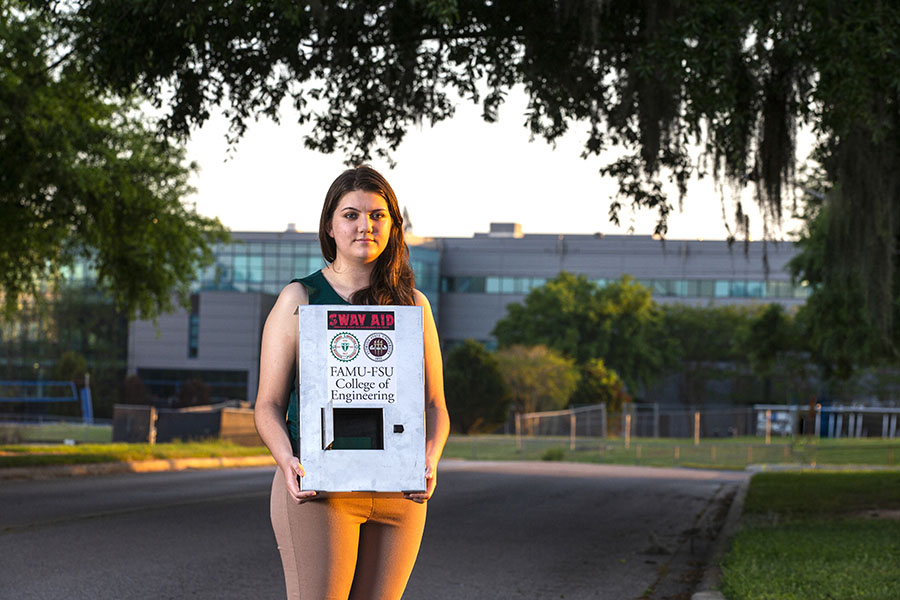
FAMU-FSU College of Engineering student Melanie Munroe was working hard to meet the demands of creating a senior design project prototype when the news of COVID-19 hit the nation.
She and her team were developing a device to prevent human trafficking when the college was closed to help control the spread of the virus. The team, called SWAY Aid — for Searching Wisely for Adolescents and Youth — suddenly had to adapt to a new way of working together, alone.
“As a senior, I’ve seen FSU’s response to hurricanes before, so I knew they would shut the Engineering Building down indefinitely due to the virus,” Munroe said. “I made sure our team members took their technology with them before leaving for spring break.”
More than 300 students are enrolled in the one-year senior design class at the FAMU-FSU College of Engineering. Teams, consisting of students from both universities, typically meet two or three times a week in a lab and are expected to deliver a prototype based on a real-world problem. The class is considered to be a capstone experience for students and is a culmination of all they have learned over the year.
Munroe and SWAY Aid team members Abraham Barron, D’Angelo Senat, Mafuor Tanji, Oswaldo Machado and Alina Montoto were building a prototype of a vending machine that dispenses a disguised GPS tracking device. The device would give human trafficking victims a way to alert authorities of their situation and whereabouts.
When the team got the news of the actual shutdown, Munroe said she was afraid they would never be able to remotely deliver what they had promised for senior design.
“I panicked when I heard the school would be shut down,” Munroe said. “I knew there was a lot expected from our team. One of our members even got detained in Colombia, under quarantine. Our adviser, Dr. Shayne McConomy, helped us figure out how to change our goals from building a prototype to focusing on the technology behind it.”
McConomy, who teaches mechanical engineering at the FAMU-FSU College of Engineering, advised the team that it was common for companies to outsource parts. He explained that the physical vending machine casing was not their product; it was the technology inside the machine that was important.
“When I met with SWAY to discuss the final expectations of their prototype, they were a little defeated about not completing the vending system,” McConomy said. “I told them to focus on the merits of their work which is the technology.”
By focusing on the technology, the team hopes to showcase how the system works. The technology behind the system involves fingerprint scanning, GPS tracking and facial recognition software. Munroe is resolved to see the project through and said everyone has had a part to play in making it work.
“We are all working on testing and validating the software from home,” Munroe said. “One of our team members has a strong electrical engineering background, and he is working specifically with the GPS and fingerprint scanning subsystem.”
Although Team SWAY Aid had to scale down the original goal, the students said they hope they can keep working on the project after graduation.
Senat enrolled the project in a Small Business Innovation Research and Small Business Technology Transfer course so that the team can apply to receive a federal grant and potentially move the project forward.
“SWAY is among many other teams that have had to make adjustments with working with each other remotely; however, I find this an excellent learning experience,” McConomy said. “Many corporations are spread throughout the United States, and even globally. Working with team members in different locations is a challenge but a necessity.”




